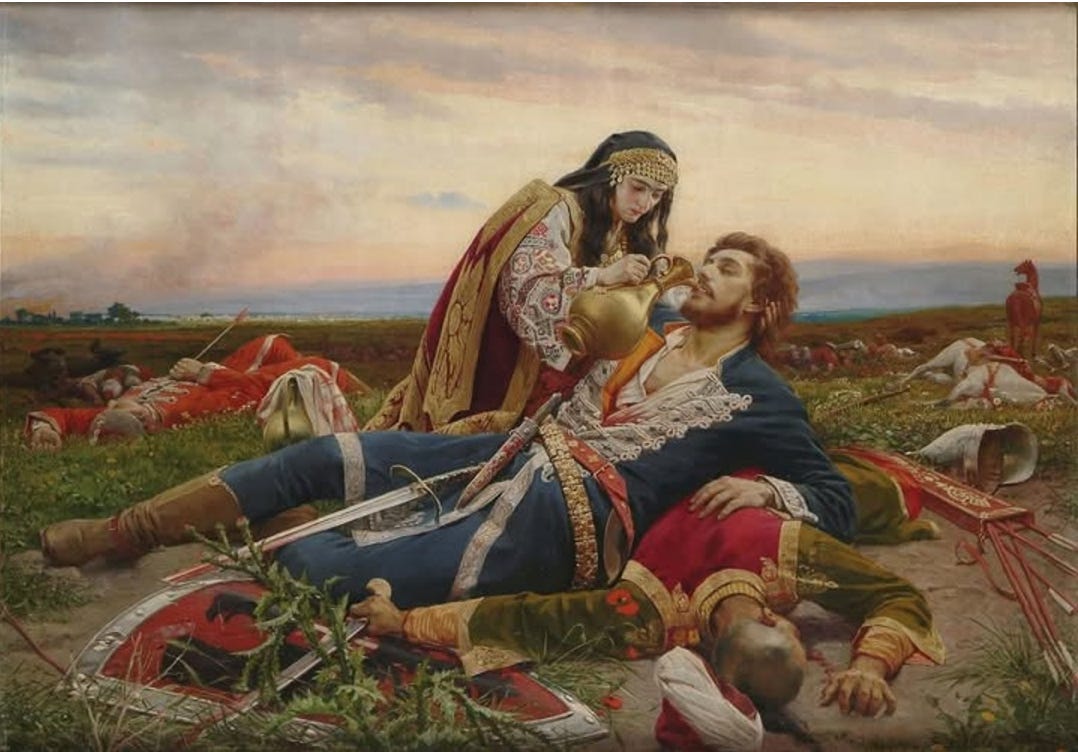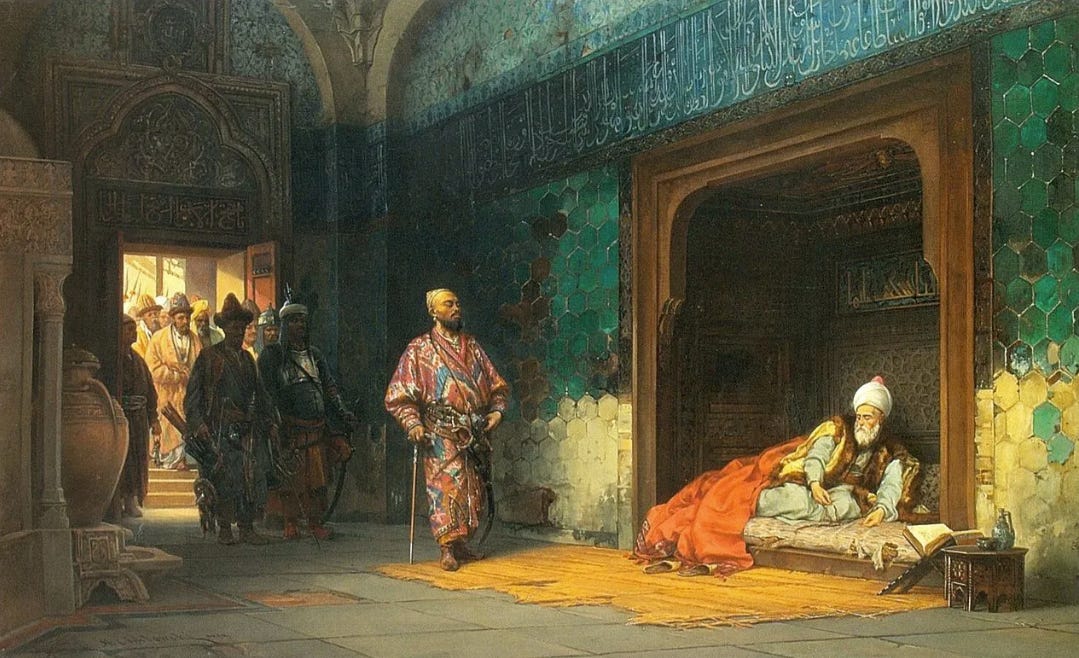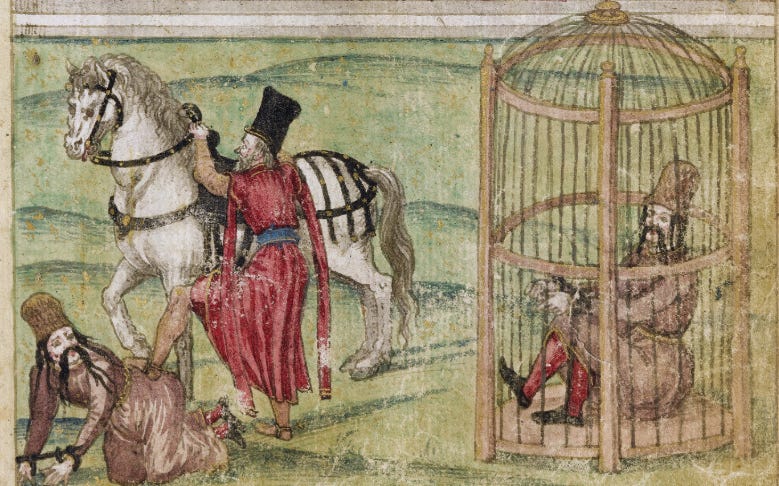George Balsha II was the ruler of the Principality of Zeta from 1385 to 1403. Zeta was the name of the area that is now Montenegro. I am writing about George Balsha II because I have learning about the Balsha family, and I have been trying to write a story about them.
In previous posts, I wrote about Balsha the First who established an independent Principality of Zeta after the death of Serbian Emperor Dushan the Mighty in 1355. Balsha’s three children (Stracimir, Durad, and Balsha II) expanded the territory of Zeta, and they became influential regional rulers. Balsha II reached the height of power for the Balsha family, but he was killed at the Battle of Savra against the Ottomans in 1385.
After Balsha’s death at Savra, Stracimir’s son George II becomes the ruler of the Balsha family territory in Zeta. George Balsha II is interesting because of the following events.
Loss of Greatness
George’s uncle (Balsha II) was the greatest achiever of the three Balsha brothers. Balsha II inherited his brothers’ territories, plus he captured Durres after years of fighting with Karl Thopia, and he expanded his rule to Vlore and Berat by marrying into the Muzaka family.
After Balsha’s death, George Balsha II inherited a large portion of the territory in the north, while southern Albania went to Balsha’s daughter. From the very beginning, George had to divide his uncle’s territory, and the Balsha family property was no longer a large single entity.
As time progressed, George’s territory was constantly under attack, and he kept losing control of large areas. The Thopia family took back Durres, Venice was attacking along the Adriatic Coast, the Ottomans were attacking from the east. The Dukagjini family, which eventually also became a very influential territorial ruler in northern Albania, also took some territory.
At all sides, George was under attack, and he lost territory that the Balsha family had previously controlled. For this reason, I think George would have a lot of psychological depth as a literary character because he would constantly have to deal with the risk of attack and the sense of loss. This would also make him feel inadequate and inferior in comparison to his uncle.
Konstantine Balsha
Another source of attack for George Balsha was his cousin Konstantine, who was Durad and Theodora’s son. Konstantine made a claim to the Balsha family territory after his uncle Balsha’s death at Savra. He constantly opposed George Balsha’s leadership - for this, George declared Konstantine an enemy of Zeta.
In return, Konstantine tried many things to gain power. He sought help from the Ottomans, he became the governor of Kruje, and he made alliances with other leaders. Because of this constant effort to gain power, I think of Konstantine as a rebellious, trickster figure (like Loki), and I think his efforts to overthrow George would add a sense of competition to a story about them.
Eventually, Konstantine was asked to support the Ottoman Sultan Bayezid in battle, but Konstantine did not show up. For this, the Ottomans put a death warrant on him, and he was captured and killed by the Venetians.
George’s Marriage
George Balsha II became married to Jelena Lazarevic, who was the daughter of Prince Lazar of Serbia (who fought and died in the Battle of Kosovo in 1389), and she was the sister of Stefan Lazarevic, who became the ruler of Serbia. Jelena came from a very powerful family, and she herself was one of the most influential women of her time.
Jelena is known for her strong personality and her deep Orthodox faith, and he encouraged Balsha to defend the Orthodox community in Zeta and to stand up against Venice’s Catholic influence in the area.
Jelena’s strong personality and deep religious faith contrasts against George Balsha’s history of failure, and I wonder what their relationship would have been like. I imagine that George Balsha would constantly feel a sense of shame and failure in relation to Jelena, and I think this difference in their relationship would be fun to write about.
Missed Opportunity
With the marriage to Jelena, George Balsha became allied to his father-in-law (Prince Lazar), who was the ruler of Serbia at that time. In 1389, Prince Lazar had an epic battle against the Ottoman Sultan Murad the First. Both rulers were killed in that battle, and both instantly became legends and religious martyrs.
The battle itself was one of the most influential events in southern Europe at the time, and it is often referred to as “Christianity’s Last Stand” against the growing Ottoman Empire. Many epics and legends were written about this event, and the current political relationship among Kosova, Serbia, and Albania continued to be influenced by this event.
You can find a small sample of this history on Wikipedia (https://en.wikipedia.org/wiki/Battle_of_Kosovo) and History Today (https://www.historytoday.com/archive/battle-kossovo-1389), and you can learn about the battle itself on these popular YouTube videos.
There is an endless amount of epic and modern literature, religious artwork, historical scholarship, and popular/mythological information about the Battle of Kosovo. Many Albanians of my generation and older grew up with this famous painting of a young girl giving a drink to a dying soldier, and we may not have realized that it was depicting a scene after the Battle of Kosovo.
The story about the Battle of Kosovo has been all around the kids of my generation and older. But honestly, I feel like I have only scratched surface from what I have studied, even though I have been reading about this battle for years. A lot of the information is in Serbian or Albanian, so it’s also difficult to read.
Anyway, as Prince Lazar’s son-in-law, George Balsha would have been expected to participate at the Battle of Kosovo, and legend says that he did go to Kosova Field with his troops, but he arrived too late. Whether this story was about George Balsha or someone else is not clear.
If it is true, this late arrival makes George’s Balsha’s character even more interesting to write about. Not only was George already a failure in comparison to his uncle, but now he totally let down his father-in-law, and he missed a once-in-a-lifetime opportunity (maybe a once-in-a-thousand-year opportunity) to make a name for himself in the history books. His involvement could have potentially made a difference against the Ottomans, and he could have gained a lot of fame and new territory.
But he was too late, and he had to return to tell the story of their defeat to his wife Jelena. This missed opportunity also aligns George Balsha to his cousin Konstantine, who also missed an opportunity to join a battle.
Reputation Restored
George Balsha got a second opportunity to stand up against the Ottomans and make a name for himself at the Battle of Tripolje in 1402.
Earlier that year, Jelena’s brother Stefan fought on behalf of the Ottoman Sultan Bayezid at the Battle of Ankara against the leader of the Mongolian Empire Timur the Lame, who is also known as Tamerlane (Christopher Marlowe’s play Tamburlaine is also based on the same character). At that time, Stefan Lazarevic was an ally of the Ottomans - his sister Olivera was married to Bayezid - and he was expected to fight in support of the Ottomans.
Sultan Bayezid was captured by Tamerlane, and he was held in a cage. Here is a famous painting that shows Bayezid’s captivity.
Other historical drawings show an actual cage.
After Bayezid’s defeat, Stefan Lazarevic saw an opportunity to establish a more independent Serbia, and he fought against his nephew Durad Brankovic and other Ottoman supporters at the Battle of Tripolje.
The Battle of Tripolje gave George Balsha an opportunity to redeem himself. While George failed to help Jelena’s father at the Battle of Kosovo, he could help her brother Stefan at Tripolje. George Balsha did participate in this fight, but, true to his legacy, he became injured, and he died from these injuries several months later.
I believe this event gives George Balsha a great character arc as a literary character. The battle allows George to finally redeem himself in Jelena’s eyes. His participation also differentiates him from his cousin Konstantine, who did not show up for a battle.
I imagine that George Balsha dies at peace at home, with the respect of his influential wife, with a sense of superiority over Konstantine, and with an overall sense of redemption.
Thank you for being a part of Lirim’s Learning Club. If you enjoyed reading this post, but have not subscribed to the newsletter, consider joining. (It’s free, and you can unsubscribe at any time. New posts will be sent directly to your email.)
My name is Lirim Neziri, and I am an educator and a writer. I love to read and learn, and this newsletter (which I call Lirim’s Learning Club) lets me share interesting things I am learning. I write about History, Literature, Writing, Education, Technology, Leadership, and Personal Productivity. Please join my learning adventure.





